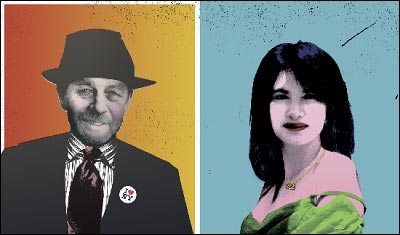
Pete Hamill is a hard-boiled tabloidist turned sentimental novelist-historian; Tama Janowitz, who hung with Warhol and skewered the eighties art scene in Slaves of New York, continues to chronicle the mores and misadventures of young New Yorkers. They have both published new New York books; Boris Kachka corralled them for frank discussion.
Have you guys ever met?
Pete Hamill: We have, at a ceremony after September 11 where we did readings. It was, alas, the only time we’ve met. Tama read from E. B. White and from her own vision of what we’d gone through, and it was extraordinary.
Nostalgia is central to both of your books. What era would you have liked to have lived in?
P.H.: I’d have liked the late nineteenth century—after electricity comes, and the place becomes full of these soaring towers. It must have been an exciting time to be alive.
Tama Janowitz: And I would have been a servant cleaning out somebody’s… .
P.H.: Yeah, and I would have been pounding the beat in the Five Points.
What is your favorite decade that you did live through?
T.J.: I feel like I sort of missed the eighties. At the time, we didn’t know we were having fun, which is probably the way it always is. Kids were coming to live out the dream, not the dream of the eighties but the dream of the sixties, with the Velvet Underground and the metallic silver pillows. I think the sixties must have been quite a lot of fun.
Pete, that’s your era.
P.H.: Maybe, but the fifties—in spite of the impression that people have of the boring Eisenhower era—were the most exciting time to be a kid. Eighth Street was the center, in terms of new ideas, new poets, the new theater. You could walk into the Cedar Tavern, the old one, and stand at the bar with Jackson Pollock, and sit in a booth with Franz Kline and talk about “Krazy Kat.” It was an unbelievably exuberant period. The sixties were a bad misunderstanding of it maybe, with a lot of bad poetry being written, imitating Gregory Corso. But there was a sense that everything was breaking open.
Tama, were you thinking of the eighties as its own decade at the time, or more as a facsimile of the sixties?
T.J.: I felt my whole life was a facsimile of a life.
P.H.: Oh, jeez.
T.J.: I’m sorry. In retrospect, of course, you just don’t think how things get speeded up. Andy, when he was alive, was much maligned. He didn’t get a retrospective, he didn’t have shows in New York. He was like a sort of Europop artist has-been. And then everything changed as soon as he died. But we’re never able to say there are amazing people here now.
What do you do when your era is over? Does time move too fast in New York?
T.J.: I think my time hasn’t come yet.
P.H.: Yeah, there’s that sense that you live in the present—obviously, you have no choice. But I think New York puts in you a sense of the past. I went away for six months and I came back and Penn Station was gone.
Tama, what’s gone that you miss the most?
T.J.: Not the dog poop. I miss the era when people could come, find a cheap place, and be able to live in the city. Now it all seems sort of fake. Williamsburg seems like a place where rich kids can live because someone’s helping them out.
But you proudly live in Prospect Heights. Why is the book titled 212?
T.J.: I was gonna call my book Raped by Butterflies, because one time I was attacked by a bunch of them, and it had sexual implications. But they didn’t care for that title. Since I’m a not very successful writer, I was happy that they were publishing me.
Do you wish you had more work?
T.J.: I would like a job, yes.
Authors Of Downtown: My Manhattan and Area Code 212: New York Days, New York Nights, respectively
